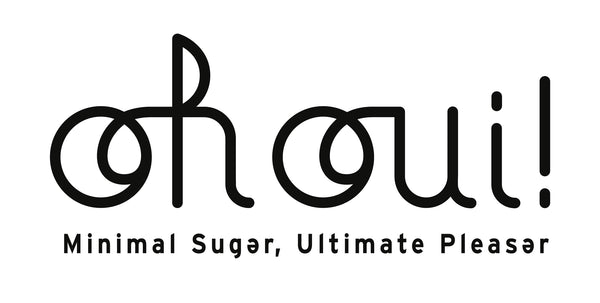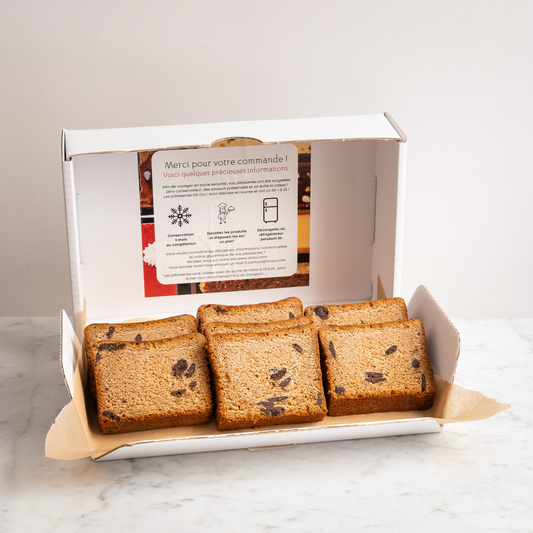When monitoring your blood sugar or trying to maintain a balanced diet, choosing the right types of sugar can make all the difference!
Carbohydrates, including sugar, are essential for providing energy to our bodies, including muscles, brain and heart. However, it is important to choose sugars with a low glycemic index to avoid blood sugar spikes.
At Oh Oui !, we are passionate about creating low glycemic index pastries and we want to share with you interesting alternatives to traditional sugar.
Here's a rundown of low-glycemic sugars you can incorporate into your recipes. 😎
👉 Maple syrup
Maple syrup, derived from maple sap, is an excellent alternative to white sugar with a slightly lower glycemic index, between 50 and 60. This syrup is also less caloric, with 260 kcal per 100 g, compared to 400 kcal for white sugar.
In addition to its sweetness, it brings a delicious amber note to your desserts, going particularly well with vanilla.
For best quality, make sure the maple syrup is pure and not mixed with corn syrup.
👉 Yacon syrup
Yacon, a plant native to the Andean region, is an interesting sweetening alternative thanks to its low glycemic index and its health benefits. This syrup is particularly rich in prebiotic fibers, which represent more than 50% of its composition. These fibers are beneficial for digestive health.
Compared to white sugar, Yacon syrup is four times less sweet and two times less caloric, making it an ideal choice for those who want to reduce their caloric intake while enjoying a natural sweetness. This syrup has a mild and slightly caramelized flavor, making it perfect for sweetening desserts, hot or cold drinks, and culinary preparations.
👉 Honey
Honey, with a glycemic index ranging from 55 to 60 for most varieties, is another interesting alternative to refined sugar. Acacia and chestnut honey, in particular, have lower glycemic indices, between 35 and 55. Honey brings a unique floral touch to your preparations, whether in creams or ganaches. To replace 150 g of sugar, use 100 g of honey. It is important to choose quality honeys to benefit from all their benefits.
👉 Grape sugar (fructose)
Although grape sugar is not yet widely available in supermarkets, it is used in our recipes for its exceptional properties. With a glycemic index of 21, it is particularly effective in maintaining stable blood sugar levels. This sugar is neutral in taste and lends itself well to creating crunchy and delicious textures in your pastries. Be careful not to abuse it: excessive consumption could tire the liver! Limit yourself to 50 g per day and explore fructose syrups in stores, which offer similar characteristics. Grape sugar is twice as sweet as white sugar, so to replace 100 g of white sugar, use only 50 g of grape sugar.
👉 Agave syrup
Agave syrup, derived from agave sap, has a very low glycemic index of 15. Its liquid texture makes it ideal for creams, ganaches and other sweet preparations. It dissolves easily in hot or cold drinks. To replace 100 g of white sugar, 50 g of agave syrup is enough, thanks to its higher sweetening power. This syrup will allow you to create creamy desserts while controlling your blood sugar.
👉 Coconut sugar
Coconut sugar, or coconut blossom sugar, is extracted from the sap of coconut flowers. With a glycemic index ranging from 35 to 55 depending on the different sources, it is an ideal alternative to traditional sugar. This crystallized sugar, with a slightly amber taste, can caramelize during cooking and add crunch to your desserts such as cookies or crumbles. Thanks to its higher sweetening power, replace 100 g of white sugar with only 50 g of coconut sugar.
Conclusion
When you’re monitoring your blood sugar or simply want to eat healthier, choosing low-glycemic sugars can help keep blood sugar levels stable while still allowing you to indulge. By using alternatives like maple syrup, honey, grape sugar, agave syrup, and coconut sugar, you can create delicious desserts without the side effects of refined white sugar.
Discover our different pastries using these low glycemic index sugars.
And you, what sweet alternative do you prefer? Share your tips and experiences in the comments below!
The Oh Oui ! Team









